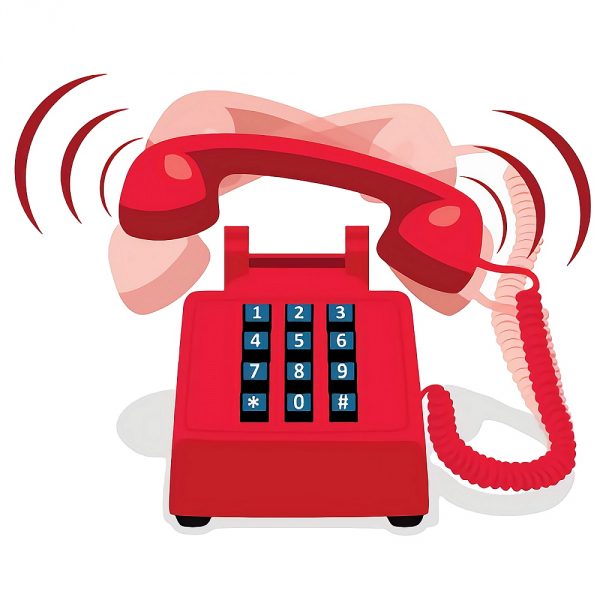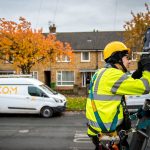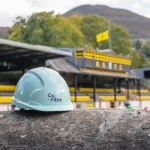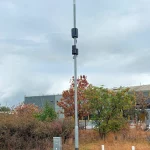Ofcom Will Stop Requiring UK Phone Providers to Offer Local Dialling

Ofcom has today launched a second consultation on the future use of UK telephone numbers, which among other things proposes to remove the obligation on phone operators to provide a “local dialling” facility (this requirement is less relevant on modern internet based networks) and to prohibit “cash for calls” schemes.
Last year saw the regulator move to reshape how phone numbers will be handled and ported in the future (here), which reflected the rapidly increasingly move away from traditional fixed line phone (PSTN) services and toward modern Internet Protocol (IP / VoIP) style platforms. Indeed, Openreach intend to withdraw traditional phone services by the end of 2025, in favour of IP based services (e.g. BT’s Digital Voice).
Going forwards more and more of us will thus be using our broadband ISP connections (e.g. ADSL, FTTC, FTTP etc.) to access voice (phone) connectivity, which also means that phone numbers themselves will naturally become more flexible (i.e. not strictly tied to a fixed location).
Advertisement
The previous consultation dealt with this transition and the need to improve number portability (work on this is ongoing), while today’s consultation represents the next stage of that review and sees Ofcom set out specific proposals to amend the existing Numbering Plan.
Ofcom’s Proposed Amendments
To remove the obligation on telecoms providers to provide a ‘local dialling’ facility.
Local dialling lets someone make a call from one landline to another landline in the same area without dialling the area code. Our research has found that the value of local dialling for consumers has declined. Given the increased complexity of providing it on IP-based networks, we consider a requirement to provide this facility is no longer justified.
To ban direct and indirect sharing of revenue with any calling party for all geographic and non-geographic numbers.
When a phone company divides the revenue that it receives for terminating a call with the calling party, this provides an incentive for making calls. This is the basis for ‘cash for calls’ schemes. Such schemes incur costs for the phone companies originating the calls and these costs could ultimately be passed on to their customers. Our proposal would remove the incentives for making these calls and prohibit these schemes.
To maintain existing rules on area codes corresponding to a particular location.
The first few digits of a landline telephone number (the area code) traditionally represent a particular location. However, IP-based call technology does not need area codes to tell it where to send a call in the same way the traditional phone network does. Our research found that while recognition of this link between area codes and geographic locations is generally declining, it continues to be valued by some people and businesses. So, we propose not to remove this link. We also propose continuing to permit some out-of-area use of geographic numbers, so people and businesses can benefit from the convenience of using these numbers more flexibly.
Ofcom’s new consultation will be open to responses until 2nd July 2021, and they intend to publish an outcome this autumn.
Mark is a professional technology writer, IT consultant and computer engineer from Dorset (England), he also founded ISPreview in 1999 and enjoys analysing the latest telecoms and broadband developments. Find me on X (Twitter), Mastodon, Facebook, BlueSky, Threads.net and Linkedin.
« Hackney Council and Hyperoptic Agree Deal to Deploy Full Fibre





















































The local dialling issue is easily resolved by software in most VoIP phones already, where it recognises the number is dialled without an area code and simply inserts a default area code in the background, which can be set to whatever is relevant to the person and their location. On our VoIP phone we dial local numbers without the area code and it works like usual.
“whatever is relevant to the person and their location” is a tricky one, especially when you consider that a phone might not be used by just one person.
@s, you would set it to match your area. If you lived in Cheltenham with dialling code of 01242, and move to VoIP keeping your same number, you would set up a dialling rule so that if no dialling code is entered it prefixes with 01242 automatically, ergo, it works like your landline of yesterday, keeping the concept of local numbers. No different really to what the electronics in the exchange is doing, just now with VoIP the exchange equipment is essentially in our own homes.
Removing the Local Dialling facility should free up millions of ‘phone numbers for future use. The 0xxxxx, 1xxxxx and 999xxx ranges in every exhange will become available, without the user having to remember that a local number is either locally diallable or has to be dialled in the National Dialling Only format for the few number ranges that have been released for National Dialling Only.
This isn’t about re-numbering so won’t free up any numbers.
Renumbering isn’t required for freeing up the numbers, but to avoid the mixture of number ranges that do and don’t require national dialling surely they’d have to remove any existing support for local dialling too?
@s – Essentially yes. Noting Ofcom’s proposal is to only to drop the mandatory requirement, with no desire to remove it entirely.
I can’t see any obvious benefit justifying it’s removal. I imagine trying to remove it on the (legacy) PSTN network would be technically challenging.
“I imagine trying to remove it on the (legacy) PSTN network would be technically challenging.”
01202 had local dialling removed a few years ago, I’m not sure many people noticed.
@David, many telcos serving VoIP business lines haven’t offered local dialling for some time now as it didn’t make sense in a business environment. Technically they were in breach of the current Ofcom regulations as support of local dialling was mandatory. These revisions will remedy that without forcing consumer providers to remove local dialling – that’s the benefit.
“Removing the Local Dialling facility should free up millions of ‘phone numbers for future use. The 0xxxxx, 1xxxxx and 999xxx ranges in every exhange will become available”
What’s the point? There has been no shortage of numbers for decades ever since the standard number lenghth was increased to 11 dgits. It’s perfectly straightforward to introduce new short area codes with longer local numbers, with parallel number translation from the old area code and number to the new for as long as necessary.
@Optimist – read the report.
Free 999xxx? Think not.
There has been no technical reason to link phone numbers to a geographic area for many years now, and OFCOM is out of touch with reality where the vast majority of people use mobiles so are used to always dialling all 11 digits of the number, and don’t really link the number to the area.
What is local anyway? Where I am there are two other area codes within a 4 mile radius and a further one less than 9 miles away. When we moved house 5 miles down the road few years ago, I simply migrated our existing “landline number” to VOIP as we couldn’t move the number across the code boundary. We never used the new number that was assigned and we have now cancelled that and have an SOGEA service for our internet. I anticipate keeping the VOIP number, wherever we move to next, even if it’s the other end of the country, or the other side of the world.
With the impending mass migration to VOIP as the PSTN closes down, it’s about time that the the UK makes all numbers 10 digits (dropping the leading zero), enables portability between “landline” and mobile numbers., and makes calls to all of these cost the same or included in packages (i.e. all current 01, 02, and 07 numbers could be VOIP or mobile)
Agreed, but you can’t do this overnight as millions of people have a phone number they want to keep. By a natural process of churn and people moving but keeping their old numbers including local dialling code because they are VoIP, and as older generations depart our world and new ones arrive, dialling codes will no longer be something that indicates where the phone is located and people will just not pay any attention to the code or even realise it used to signify something.
As it stands I live in area with an elderly population, you ask for a neighbours phone number and you get 6 digits. Many times I’ve given my “landline” phone number out, where I give the code and number, when its elderly neighbours it causes puzzlement and confusion to be given the whole number when they are on the same street, and what they write down is just the last 6 digits, and that is what they dial.
I think you’ve misunderstood. You’ll still need an area code. This is removing the ability to dial WITHOUT one. So youll have to dial all 10 or 11 digits just to call your neighbour.
6 digits? The long-standing residents of our village still give out the last 3 digits of their numbers. I think it may also be a code for “I’m pretending not to be an incomer”, so we’ve joined in.
Some areas, such as Milton Keynes, already have this in place. 01908 was short on numbers and local dialling was removed a few years ago. So lessons learned in those areas already done should guide this
Why did they not simply allocate a shorter area code and lengthen the local numbers to 7 digits, as was done in the past? There is plenty of scope for allocating new area coses in 02 space, currently only half used.
@optimist Giving everyone new numbers is an option, but it’s not an easy one. Ofcom & the phone companies need to run a marketing campaign so everyone knows about the number change. Everyone needs to update their address books, and companies need to get signs re-made and stationary re-printed. So yes, re-numbering is possible, but it’s not something to be done lightly.
One small detail seems to have been conveniently forgotten in this rush for VOIP: 999 calls.
They’re normally excluded from any VOIP service – prominent Skype warnings, for example – so how are these going to be handled?
999 doesn’t matter until that one time years later when you have some critical emergency. This is my reason for hanging on to my old phone line even though I’d have the option of removing it while still getting internet access.
Sipgate give 999 calling on all their accounts including the low cost Basic PAYG. As do Voipfone.
So VOIP Providers can offer 999 if they have a mind to and unlike the USA it is free here.
The warnings are mainly for customers in other countries. Many countries ban emergency calls from Skype and others.
UK doesn’t and never has, but enforce warnings that an interrupted Internet connection wi cut 999 service too. PSTN still has the benefit of continuing to work even when the power is out…
Sipgate basic, has 999 and you can add an address to it so the 999 service knows who called if it is a silent call.
I think in the UK 999 calls can only be offered by a VoIP service if the user of that service has a validated address. This is possibly to help stop abuse of the system, or denial of service attacks to 999 from apps like Skype, and also so that 999 calls can be traced to an address if the person making the call can not provide a location.
Sipgate, even on their free account, will want an address and so write to you with a code to continue the registration to allow 999 calls, this validates the address is real and person opening the account is genuine.
999 calls will be supported by all major VoIP operators in the UK on landline replacement services over VoIP. Whether you’ll be able to make that call in an emergency (i.e. fire or floods that have already knocked out your Internet or power) is of course another matter.
Can’t see a problem, happened in many places. People coped 40 years ago going from 3 digit numbers to 6 and losing local dialling codes, 0xxx > 01xxx etc.
I live in Milton Keynes and never had a problem with having to use the 01908… when calling local numbers after conversion. Never met anyone who had.
Maintaining the requirement for a link between the first 3-5 digits of the number and geographic location will simply mean that the number of numbers (!!!) out of compliance will continue to grow.
Anyway it’s already misunderstood by a majority of people for 020.
I am elderly and use my landline constantly, largely for local calls, and I will miss this facility if it is withdrawn. Furthermore, using a landline is simple. I rarely use a mobile, only for emergencies and I do not have a smart phone – all too complicated, fiddly, time-consuming and expensive by comparison. I’ve tried it. Life will be much more stressful if landlines are phased out. I have several elderly friends who feel the same. Old people matter too! even if we shall soon all be dead and it won’t matter, to your way of thinking! And what about handicapped people?
For decades there have been handsets which enable you to store numbers, I’ve still got one (a BT Response 500) which I obtained in 1994. It’s called direct dialling, all you do is store a number of up to 24 digits and map it to one of the 10 memory location buttons, and to make a call you just press a button.
Ofcom should have created nationwide 02 codes in 8 digits as planned years ago. Coventry has far too many numbers and Brighton doesn’t have enough
Saying that, I dropped having a landline for my business years ago. It’s not necessary, everyone who calls me is on a mobile and for the few that are not, I offer to call them back to discuss what they’re looking for
I even have a local 0191 number overlays my mobile from Flextel. £10 lasts a couple of years as hardly anyone chooses it even though it’s on my website next to the mobile